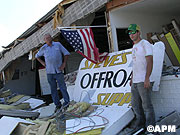Washington, DC — (AP) Health and Human Services Secretary Michael Leavitt said Sunday the death toll from Hurricane Katrina and its aftermath is in the thousands, the first time a federal official has acknowledged what many had feared.
Leavitt said he couldn't provide a precise number on the impact of the devastation, but when asked if it was in the thousands, he told CNN's "Late Edition," "I think it's evident it's in the thousands."
"It's clear to me that this has been sickeningly difficult and profoundly tragic circumstance," Leavitt said.
New Orleans Mayor Ray Nagin said it was likely thousands were dead based on the city's population of 500,000, the percentage who left before the storm hit and the number evacuated from the shelters.
"So you probably have another 50-60,000 out there," Nagin said. "You do the math, man, what do you think? Five percent is unreasonable? Ten percent? Twenty percent? It's going to be a big number."
Earlier in the day, Homeland Security Secretary Michael Chertoff had declined to estimate the death toll, but conceded that an untold number of people could have perished in swamped homes and temporary shelters where many went for days without food or water.
"I think we need to prepare the country for what's coming," Chertoff said. "What's going to happen when we de-water and remove the water from New Orleans is we're going to uncover people who died, maybe hiding in houses, got caught by the flood, people whose remains are going to be found in the streets. ... It is going to be about as ugly of a scene as I think you can imagine."
Leavitt said he had received a report of an outbreak of dysentery in Biloxi, Miss., with disease among the concerns of federal officials in the hurricane's aftermath. Dysentery is a painful intestinal disease that can cause dehydration and can sometimes be fatal.
The lack of clean drinking water in parts of the Gulf Coast region and standing flood waters with decomposing bodies and human waste in the streets of New Orleans could cause a rash of infectious diseases, including West Nile virus and the often fatal E. coli bacteria.
"All of the infectious diseases that occur when people are in large congregations of people can spread," Leavitt said.
Amid widespread criticism about a slow and ineffectual response to the crisis, the Bush administration dispatched several top officials to the region: Chertoff, Defense Secretary Donald H. Rumsfeld, Joint Chiefs of Staff Chairman Gen. Richard Myers and Secretary of State Condoleezza Rice.
President Bush and first lady Laura Bush visited the Red Cross' disaster operation center, where they thanked employees. The president also announced that the White House would hold a blood drive on Friday.
"The world saw this tidal wave of disaster ascend upon the Gulf Coast," said Bush, who plans to return to the region Monday. "Now they can see a tidal wave of compassion."
In a series of interviews, Chertoff said the evacuation and relief operations are under way - with federal assistance in place.
"There's no question that with the addition of National Guard and regular troops we've secured the city," Chertoff said on "Fox News Sunday." "We've got the adequate personnel now who are able to make sure that we have a comprehensive evacuation effort."
The criticism has continued unabated as it has taken days for food and water to reach thousands who took shelter in the Superdome, the New Orleans convention center and even the hard concrete of the highways traversing the city.
Nagin told NBC News on Sunday that the situation has been "a tragedy, a disgrace."
Chertoff said authorities are in place to handle the crisis, while cautioning that major challenges lay ahead.
"We are still in the middle of an emergency," he said on CNN's "Late Edition." "This is not the time when we can draw a sigh of relief."
Chertoff defended the job of FEMA Director Michael Brown and declined to get into a discussion about whether the government moved quickly and forcefully enough to deal with the catastrophe, saying there would be plenty of time for a review.
He did complain about problems getting information from local officials.
"One of the things we'll look at is why in the middle of this emerging crisis there was kind of a conflict on the information," Chertoff said on the Fox program.
Chertoff shrugged off suggestions that the demand for National Guard troops in Iraq had depleted the numbers available to respond to the crisis.
On Saturday, Bush ordered more than 7,000 active duty forces to the region and 10,000 National Guard troops were being sent to the Gulf Coast. All total, the number of Guard personnel in the stricken states is about 40,000.
Chertoff said Saturday that more than 100,000 people had received humanitarian aid and the Coast Guard had rescued 9,500 people.




